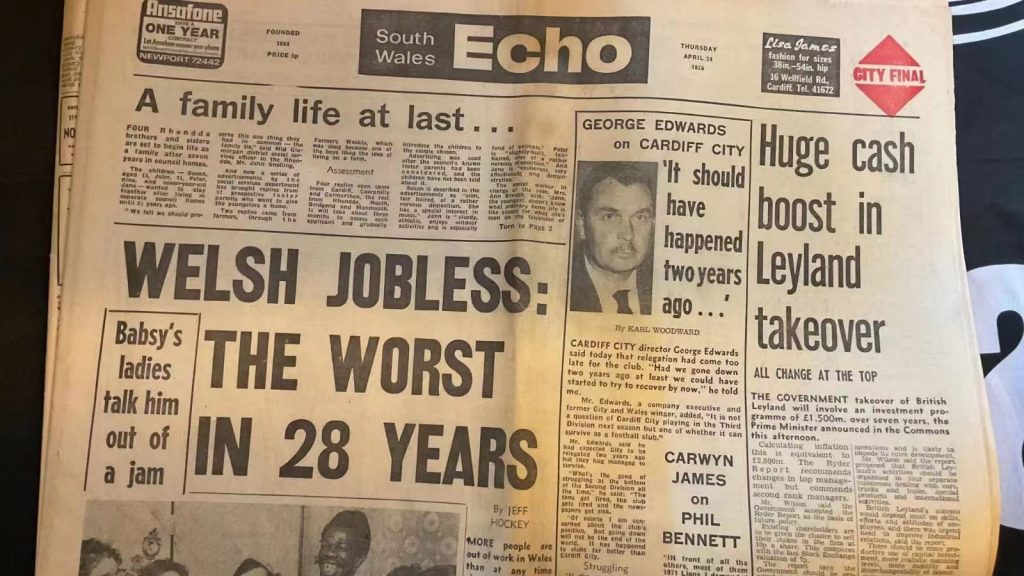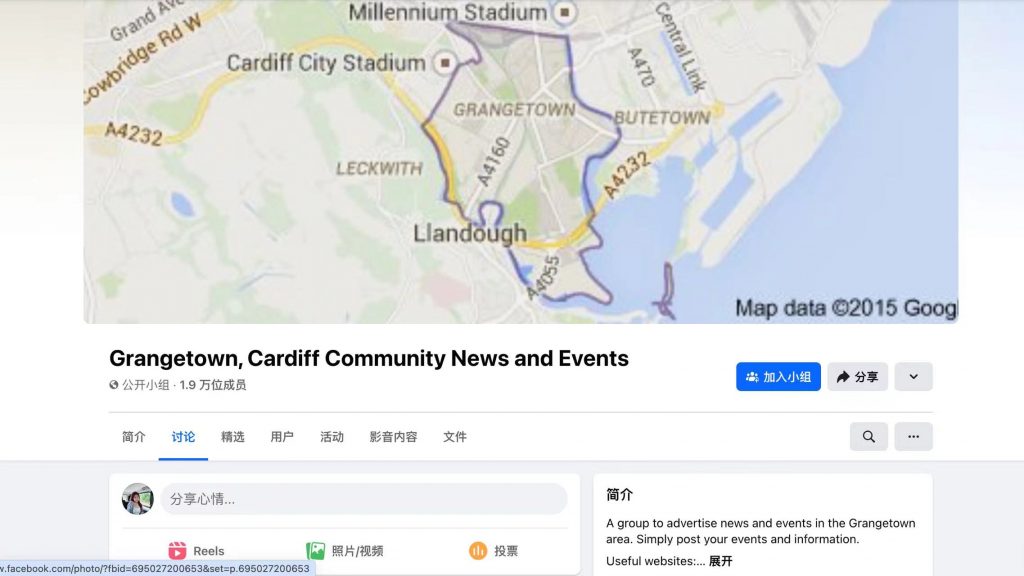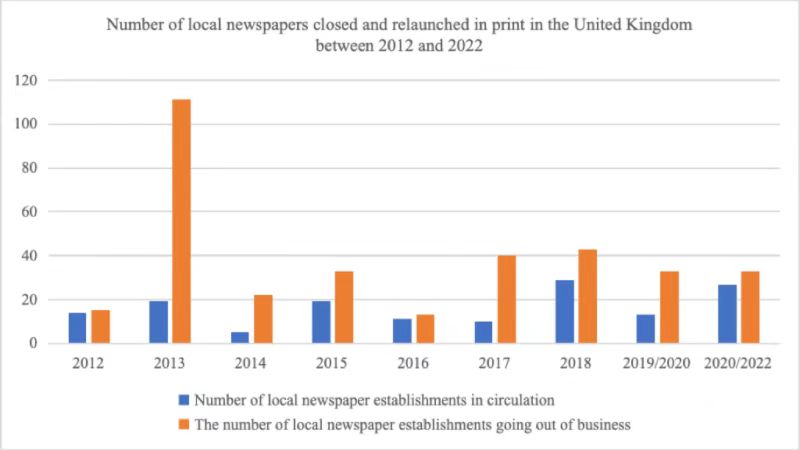The number of local news organizations in UK has declined significantly. What are the reasons for this current situation? What impact does local journalism have on local democracy?
The Guardian says there are probably fewer alive and functioning newspapers in the UK today than at any point in the 18th century. This means that local news organizations are facing an existential crisis.
In particular, the local newspaper industry has been sounded alarm bells in this existential crisis. It is understood that from 2011, the South Wales Echo, the most representative newspaper in Wales, began to cease sales.

“You know newspapers are no longer available everywhere, I can watch TV and listen to the radio, but it’s hard for me to buy a newspaper anymore, not because I don’t want to, but because I can’t,” said Elizabeth Cooling, a Cardiff resident.
In the past year, Reach, the largest owner of regional and local newspapers in the UK, has carried out two rounds of job cuts, and the number of local newspapers has fallen again, according to research by the Press Gazette, more than 200 local newspapers have closed in the UK since 2005.
Many factors have contributed to the dramatic decline in the number of local news organizations. Alan Kirk, a former Scottish local newspaper editor, says from his own experience that changes to the distribution model have also taken a toll on local journalism.
“When I worked at the local paper, it was making a major shift from paid to free. This is driven by advertising. Advertisers want their ads to attract more eyeballs. They prefer a free newspaper with a circulation of 100,000 to a paid one with a circulation of 10,000. Many free newspapers were started by businessmen who had no interest in journalism. They write trivial stories and press releases in the paper. As a result, local journalism has suffered tremendously, ” Alan Kirk says.
In addition, the way the public gets news has changed from “waiting” for news broadcasts to searching on various media information platforms.
“In the past, the public and all kinds of news and information can only be built through newspapers or television media. But now, with the advent of social media, especially multimedia platforms such as Google and Facebook, the bridge has been completely ‘cut’ and readers have become free, ” says by Silu Zhang, who works for the BBC’s broadcasting department.
In his article, the Guardian’s media editor Jim Watson also pointed out that Facebook groups have gradually become the default source of information in many UK towns and cities, replacing local newspapers. The disappearance or replacement of regional news agencies will make it difficult for residents to obtain authoritative information about their own areas, which will further lead to the emergence of news deserts.

A Facebook news group in Grangetown, Cardiff, which has more than 20,000 members.
News desert refers to the lack of access to reliable and authoritative information or news within a given geographic area, which often underpins grass-roots democracy.
“The news desert is not just common in the UK, it is a problem in the global news industry. Especially in remote areas, this kind of regional news itself is limited by the size of the population, because people only want to read the information about themselves. When people in your community stop reading this kind of news, then local news organizations are in trouble – they have no readership and no circulation, ” says Alan Kirk.
“In the end, such news organizations are forced to close down by practical factors. Or there are news organizations that maintain a superficial operation, but in reality it’s a simple patchwork of information that doesn’t make sense to local communities, ” Alan says. Local residents will not have access to effective news and information about their local communities, further affecting grassroots democracy in the region.
Guardian US columnist Margaret Sullivan commented in her article that the decline of local news organizations is also a threat to democracy itself.
The decline of local news organizations has ushered in dark times for grassroots democracy, as disinformation and emotional political rhetoric sway civic thinking.
“I don’t think the public is fully aware that their minds are being swayed. While members of the public can also share or search for regional news in Facebook groups, such information is often not fact-checked by professional news organizations, and the public can easily be inflamed by such unverified information, ” says Alan Kirk.
For example, in November 2023, a fake audio clip of London Mayor Sadiq Khan about Palestinian demonstration was widely circulated on social media, inciting a public backlash that eventually led to violence.
In the past, in order for local newspapers to report more meaningful local news, reporters often turned into “participants” to broadcast local council information. Even at that time, newspaper organizations also set up special posts such as “political editor” and “municipal reporter”.

These posts ensured that local democracy flourished during the period. Alan says local journalism is important for grassroots democracy.
“Particularly in planning and zoning issues. Local councils set rules on things like parking, sound levels at entertainment areas, enforcement of building regulations that have a real bearing on people’s lives. National political affiliations are largely irrelevant. A Communist councillor might be more effective than a Conservative or vice versa. Local media gives voters a chance to assess them on their performance rather than their political labels,”he says.
https://www.youtube.com/watch?v=mIikgVSXXn8
The reports of local news agencies have a supervisory effect on the behavior of local councils. Once some mistakes are exposed, they often attract the attention of local council staff quickly, because they must immediately set an example in order to gain the support of more local residents.
“My experience is that councils and councilors jump quickly when local media highlight something that is wrong. Exposure in local media is often sought by people seeking political office. Individuals who are active and doing good work for the community get noticed and have good electoral success. Individuals with poor character are exposed quickly,”Alan Kirk says。
Dr Rachel Matthews, associate professor of journalism at Coventry University, gave his views on the importance of local journalism in a Guardian report on the desert. He said the public trusted local newspapers much more than national papers.
This is because local journalism reports local political issues from the perspective of voters, that is, as “participants”, so they can have a good grasp of the problems existing in local communities and political declarations, so the reports presented are easily accepted by readers.
But local newspaper organizations have long since eliminated specific news posts responsible for local councils, and reporters who report on local councils have begun to report only as reporters, not as participants. Local journalism is struggling to cope with declining circulation and reading as it no longer evokes the same empathy as it did in the past.
With the gradual disappearance of local journalism, the channels for the public to exercise their democratic rights are gradually narrowed, and the consciousness of community residents is also reduced.

This is because the thoughts and views contained in local news reports on certain events can often influence the thoughts of residents in the entire region, making their thoughts similar.
Writing in the Guardian about the decline of British towns and cities into news deserts, Steven Bucklebow of City University London says local journalism can be seen as the glue that holds local communities together.
Buckley says people don’t necessarily want local news in their town to be big news, but they get excited even when they see stories about back-to-school events in their area.
Will local journalism disappear in the future?
Daniel Bevan, an ITV reporter based in Wales, said it was unclear whether the “death of newspapers” would become a reality in the next decade. But he has been hoping to draw more people attention to the state of local journalism.
“There’s a lack of attention on regional news broadcasts, and people think there’s nothing important in the news, nothing interesting in the news. They don’t have enough advertising revenue, and they can’t absorb new technology. They eventually had to shut down or lay off workers. “
“The decline or disruption of local journalism is bad for journalists and bad for the public. I’m not worried about my career. I worry about whether the so-called mass media industry will become journalism for the “majority.” Who can speak for the “few”?” he says.
The future of local journalism remains to be seen, says Mr Kirk, but he does not think it will die out altogether. Because the coverage of local journalism affects the grassroots democracy of the region.
“Local news can survive if there is a business model to support it. It is theoretically possible for local governments, companies or individuals to take some form of funding to help the media. And when it comes to important issues, it’s usually nuisances or planning issues that get reported. It would be a great loss if these controversies were not made public, ” he says.
